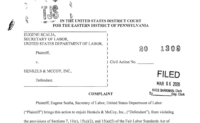Highway Infrastructure
Coalition Pushes National Vehicle-Miles-Traveled Program
More than 30 construction, engineering, transportation and other groups and companies have called on key congressional lawmakers to include steps to implement a new national vehicle-miles-traveled, or VMT, fee as they draft a new surface transportation bill in coming weeks.
In an April 13 letter to Senate and House committee leaders working on major parts of the envisioned transportation bill, the organizations and companies say the flow of motor-fuel taxes into the Highway Trust Fund has weakened, due to more electric vehicles and increased fuel efficiency of conventional cars and trucks.
Fourteen states have been investigating and testing the user-fee concept over the past several years with the help of $74 million in federal grants. “It is now time for Congress to leverage the progress made to date and create a comprehensive national VMT implementation program,” the coalition says.
The goal would be to have a new fee “replace all current motor fuel taxes and fees,” say members, which includes the American Association of State Highway and Transportation Officials, Associated General Contractors of America, AECOM, Jacobs and WSP USA.
The groups apparently aren't calling for a complete, immediate switchover of all U.S. motor vehicles to VMTs but say the U.S. Postal Service and other federal and state fleets "provide an ideal testbed for consideration for a national VMT program."
Revenue from a nationwide VMT-type fee would not be nearly enough to close the trust fund’s $195-billion shortfall, based on estimates from the Congressional Budget Office.
Still, key legislators on the Senate Environment and Public Works and House Transportation and Infrastructure Committees have expressed support for including a nationwide test program of VMT-type fees in the coming highway-transit legislation.
The Senate committee delved into the trust fund’s woes and the issue of alternative road user charges at an April 14 hearing.
[View webcast of Senate hearing here.]
Committee Chairman Tom Carper (D-Del.) said automakers including General Motors are making the transition to electric vehicles and exploring vehicles powered by hydrogen fuel cells.
“Gas and diesel [tax] revenues, our traditional bread and butter for building roads, highways, bridges and maintaining them, are not going to dry up and go away overnight,” he said. “We need to draft a surface transportation bill that enables us to get in front of what’s happening here.”
One large and persistent problem is the Highway Trust Fund. Since 2008, Congress has propped it up with more than $150 billion in transfers from the general fund.
But without an infusion of new revenue, the Congressional Budget Office estimates that balances in the Trust Fund’s highway and transit accounts will be gone in 2022, Joseph Kile, its director of microeconomic analysis, told the Senate committee.
He added that the trust fund's total shortfall over the next 10 years is estimated at $195 billion.
But based on VMT fees some states charge on commercial trucks, CBO calculates that each penny in VMT charges would raise $2.6 billion a year, Kile said. That is an apparent reference to a 2019 CBO report.
“So, we’ve got a big gap,” said Sen. Shelley Moore Capito of West Virginia, top committee Republican.



